The QFormLayout class manages forms of input widgets and their associated labels.
More...
|
| | QFormLayout (QWidget *parent=nullptr) |
| |
| | ~QFormLayout () |
| |
| void | addItem (QLayoutItem *item) override |
| |
| void | addRow (const QString &labelText, QLayout *field) |
| |
| void | addRow (const QString &labelText, QWidget *field) |
| |
| void | addRow (QLayout *layout) |
| |
| void | addRow (QWidget *label, QLayout *field) |
| |
| void | addRow (QWidget *label, QWidget *field) |
| |
| void | addRow (QWidget *widget) |
| |
| int | count () const override |
| |
| Qt::Orientations | expandingDirections () const override |
| |
| FieldGrowthPolicy | fieldGrowthPolicy () const |
| |
| Qt::Alignment | formAlignment () const |
| |
| void | getItemPosition (int index, int *rowPtr, ItemRole *rolePtr) const |
| |
| void | getLayoutPosition (QLayout *layout, int *rowPtr, ItemRole *rolePtr) const |
| |
| void | getWidgetPosition (QWidget *widget, int *rowPtr, ItemRole *rolePtr) const |
| |
| bool | hasHeightForWidth () const override |
| |
| int | heightForWidth (int width) const override |
| |
| int | horizontalSpacing () const |
| |
| void | insertRow (int row, const QString &labelText, QLayout *field) |
| |
| void | insertRow (int row, const QString &labelText, QWidget *field) |
| |
| void | insertRow (int row, QLayout *layout) |
| |
| void | insertRow (int row, QWidget *label, QLayout *field) |
| |
| void | insertRow (int row, QWidget *label, QWidget *field) |
| |
| void | insertRow (int row, QWidget *widget) |
| |
| void | invalidate () override |
| |
| QLayoutItem * | itemAt (int index) const override |
| |
| QLayoutItem * | itemAt (int row, ItemRole role) const |
| |
| Qt::Alignment | labelAlignment () const |
| |
| QWidget * | labelForField (QLayout *field) const |
| |
| QWidget * | labelForField (QWidget *field) const |
| |
| QSize | minimumSize () const override |
| |
| int | rowCount () const |
| |
| RowWrapPolicy | rowWrapPolicy () const |
| |
| void | setFieldGrowthPolicy (FieldGrowthPolicy policy) |
| |
| void | setFormAlignment (Qt::Alignment alignment) |
| |
| void | setGeometry (const QRect &rect) override |
| |
| void | setHorizontalSpacing (int spacing) |
| |
| void | setItem (int row, ItemRole role, QLayoutItem *item) |
| |
| void | setLabelAlignment (Qt::Alignment alignment) |
| |
| void | setLayout (int row, ItemRole role, QLayout *layout) |
| |
| void | setRowWrapPolicy (RowWrapPolicy policy) |
| |
| void | setSpacing (int spacing) |
| |
| void | setVerticalSpacing (int spacing) |
| |
| void | setWidget (int row, ItemRole role, QWidget *widget) |
| |
| QSize | sizeHint () const override |
| |
| int | spacing () const |
| |
| QLayoutItem * | takeAt (int index) override |
| |
| int | verticalSpacing () const |
| |
| | QLayout () |
| |
| | QLayout (QWidget *parent) |
| |
| bool | activate () |
| |
| void | addWidget (QWidget *w) |
| |
| QMargins | contentsMargins () const |
| |
| QRect | contentsRect () const |
| |
| QSizePolicy::ControlTypes | controlTypes () const override |
| |
| Qt::Orientations | expandingDirections () const override |
| |
| QRect | geometry () const override |
| |
| void | getContentsMargins (int *left, int *top, int *right, int *bottom) const |
| |
| virtual int | indexOf (QWidget *widget) const |
| |
| void | invalidate () override |
| |
| bool | isEmpty () const override |
| |
| bool | isEnabled () const |
| |
| QLayout * | layout () override |
| |
| int | margin () const |
| |
| QSize | maximumSize () const override |
| |
| QWidget * | menuBar () const |
| |
| QSize | minimumSize () const override |
| |
| QWidget * | parentWidget () const |
| |
| void | removeItem (QLayoutItem *item) |
| |
| void | removeWidget (QWidget *widget) |
| |
| virtual QLayoutItem * | replaceWidget (QWidget *from, QWidget *to, Qt::FindChildOptions options=Qt::FindChildrenRecursively) |
| |
| bool | setAlignment (QLayout *layout, Qt::Alignment alignment) |
| |
| void | setAlignment (Qt::Alignment alignment) |
| |
| bool | setAlignment (QWidget *widget, Qt::Alignment alignment) |
| |
| void | setContentsMargins (const QMargins &margins) |
| |
| void | setContentsMargins (int left, int top, int right, int bottom) |
| |
| void | setEnabled (bool enable) |
| |
| void | setGeometry (const QRect &rect) override |
| |
| void | setMargin (int margin) |
| |
| void | setMenuBar (QWidget *widget) |
| |
| void | setSizeConstraint (SizeConstraint constraint) |
| |
| void | setSpacing (int spacing) |
| |
| SizeConstraint | sizeConstraint () const |
| |
| int | spacing () const |
| |
| void | update () |
| |
| | QObject (QObject *parent=nullptr) |
| |
| | ~QObject () |
| |
| bool | blockSignals (bool block) |
| |
| const QList< QObject * > & | children () const |
| |
| bool | connect (const QObject *sender, const QString &signalMethod, const QString &location, const QString &slotMethod, Qt::ConnectionType type=Qt::AutoConnection) |
| |
| bool | connect (const QObject *sender, const QString &signalMethod, const QString &slotMethod, Qt::ConnectionType type=Qt::AutoConnection) |
| |
| bool | disconnect (const QObject *receiver, const QString &slotMethod=QString ()) const |
| |
| bool | disconnect (const QString &signalMethod, const QString &location, const QObject *receiver=nullptr, const QString &slotMethod=QString ()) const |
| |
| bool | disconnect (const QString &signalMethod=QString (), const QObject *receiver=nullptr, const QString &slotMethod=QString ()) const |
| |
| void | dumpObjectInfo () |
| |
| void | dumpObjectTree () |
| |
| QList< QString > | dynamicPropertyNames () const |
| |
| virtual bool | event (QEvent *event) |
| |
| virtual bool | eventFilter (QObject *watched, QEvent *event) |
| |
| template<typename T > |
| T | findChild (const QString &childName=QString ()) const |
| |
| template<class T > |
| QList< T > | findChildren (const QRegularExpression ®Exp, Qt::FindChildOptions options=Qt::FindChildrenRecursively) const |
| |
| template<class T > |
| QList< T > | findChildren (const QString &childName=QString (), Qt::FindChildOptions options=Qt::FindChildrenRecursively) const |
| |
| bool | inherits (const QString &className) const |
| |
| void | installEventFilter (QObject *filterObj) |
| |
| bool | isWidgetType () const |
| |
| bool | isWindowType () const |
| |
| void | killTimer (int id) |
| |
| const QMetaObject * | metaObject () const |
| |
| void | moveToThread (QThread *targetThread) |
| |
| QString | objectName () const |
| |
| QObject * | parent () const |
| |
| template<class T = QVariant> |
| T | property (const QString &name) const |
| |
| void | removeEventFilter (QObject *obj) |
| |
| void | setObjectName (const QString &name) |
| |
| void | setParent (QObject *parent) |
| |
| bool | setProperty (const QString &name, const QVariant &value) |
| |
| bool | signalsBlocked () const |
| |
| int | startTimer (int interval, Qt::TimerType timerType=Qt::CoarseTimer) |
| |
| QThread * | thread () const |
| |
| | QLayoutItem (Qt::Alignment alignment=Qt::Alignment ()) |
| |
| virtual | ~QLayoutItem () |
| |
| Qt::Alignment | alignment () const |
| |
| virtual int | minimumHeightForWidth (int width) const |
| |
| void | setAlignment (Qt::Alignment alignment) |
| |
| virtual QSpacerItem * | spacerItem () |
| |
| virtual QWidget * | widget () |
| |
|
| void | destroyed (QObject *obj=nullptr) |
| |
| void | objectNameChanged (const QString &objectName) |
| |
| void | deleteLater () |
| |
| static QSize | closestAcceptableSize (const QWidget *widget, const QSize &size) |
| |
| static bool | connect (const QObject *sender, const QMetaMethod &signalMethod, const QObject *receiver, const QMetaMethod &slotMethod, Qt::ConnectionType type=Qt::AutoConnection) |
| |
| static bool | connect (const QObject *sender, const QString &signalMethod, const QObject *receiver, const QString &slotMethod, Qt::ConnectionType type=Qt::AutoConnection, const QString &location=QString ()) |
| |
| static bool | connect (const QObject *sender, const QString &signalMethod, const QString &location, const QObject *receiver, const QString &slotMethod, Qt::ConnectionType type=Qt::AutoConnection) |
| |
| template<class Sender , class SignalClass , class... SignalArgs, class Receiver , class SlotClass , class... SlotArgs, class SlotReturn > |
| static bool | connect (const Sender *sender, void (SignalClass::*signalMethod)(SignalArgs...), const Receiver *receiver, SlotReturn (SlotClass::*slotMethod)(SlotArgs...), Qt::ConnectionType type=Qt::AutoConnection) |
| |
| template<class Sender , class SignalClass , class... SignalArgs, class Receiver , class T > |
| static bool | connect (const Sender *sender, void (SignalClass::*signalMethod)(SignalArgs...), const Receiver *receiver, T slotLambda, Qt::ConnectionType type=Qt::AutoConnection) |
| |
| static bool | disconnect (const QObject *sender, const QMetaMethod &signalMethod, const QObject *receiver, const QMetaMethod &slotMethod) |
| |
| static bool | disconnect (const QObject *sender, const QString &signalMethod, const QObject *receiver, const QString &slotMethod) |
| |
| static bool | disconnect (const QObject *sender, const QString &signalMethod, const QString &location, const QObject *receiver, const QString &slotMethod) |
| |
| static bool | disconnect (const QObject *sender, std::nullptr_t, const QObject *receiver, std::nullptr_t) |
| |
| template<class Sender , class SignalClass , class... SignalArgs, class Receiver , class SlotClass , class... SlotArgs, class SlotReturn > |
| static bool | disconnect (const Sender *sender, void (SignalClass::*signalMethod)(SignalArgs...), const Receiver *receiver, SlotReturn (SlotClass::*slotMethod)(SlotArgs...)) |
| |
| template<class Sender , class SignalClass , class... SignalArgs, class Receiver > |
| static bool | disconnect (const Sender *sender, void (SignalClass::*signalMethod)(SignalArgs...), const Receiver *receiver, std::nullptr_t slotMethod=nullptr) |
| |
| template<class Sender , class SignalClass , class... SignalArgs, class Receiver , class T > |
| static bool | disconnect (const Sender *sender, void (SignalClass::*signalMethod)(SignalArgs...), const Receiver *receiver, T slotMethod) |
| |
| static QMetaObject & | staticMetaObject () |
| |
| static QString | tr (const char *text, const char *comment=nullptr, std::optional< int > numArg=std::optional< int >()) |
| |
| void | addChildLayout (QLayout *layout) |
| |
| void | addChildWidget (QWidget *widget) |
| |
| QRect | alignmentRect (const QRect &rect) const |
| |
| void | childEvent (QChildEvent *event) override |
| |
| virtual void | childEvent (QChildEvent *event) |
| |
| virtual void | connectNotify (const QMetaMethod &signalMethod) const |
| |
| virtual void | customEvent (QEvent *event) |
| |
| virtual void | disconnectNotify (const QMetaMethod &signalMethod) const |
| |
| bool | isSignalConnected (const QMetaMethod &signalMethod) const |
| |
| int | receivers (const QString &signal) const |
| |
| QObject * | sender () const |
| |
| int | senderSignalIndex () const |
| |
| virtual void | timerEvent (QTimerEvent *event) |
| |
| T | qobject_cast (QObject *object) |
| |
| | QObjectList |
| |
The QFormLayout class manages two column forms of input widgets and their associated labels. The left column is usually the label control and the right column is a widget like a text line editor, spin box or combo box.
Using a QFormLayout has the following advantages over using a QGridLayout.
-
Uses the platform look and feel. For example, Mac OS X and KDE guidelines specify the labels should be right aligned. While Windows and GNOME applications normally use left alignment.
-
For devices with small displays, QFormLayout can be set to wrap long rows or even to wrap all rows.
-
Convenient API for creating label field pairs.
Appearance
The table below shows the default appearance in different styles.
| QCommonStyle Derived Styles | QMacStyle | QFusionStyle | Extended Styles |
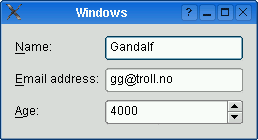 | 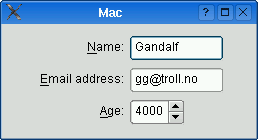 | 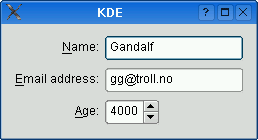 | 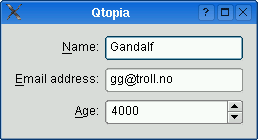 |
| Traditional style used for Windows, GNOME, and earlier versions of KDE. Labels are left aligned, and expanding fields grow to fill the available space. | Style based on the Mac OS X Aqua guidelines. Labels are right-aligned, the fields do not grow beyond their size hint, and the form is horizontally centered. | Recommended style for KDE applications. Similar to MacStyle, except that the form is left-aligned and all fields grow to fill the available space. | Default style for CopperSpice Extended styles. Labels are right-aligned, expanding fields grow to fill the available space, and row wrapping is enabled for long lines. |
The styles can be overridden by calling setLabelAlignment(), setFormAlignment(), setFieldGrowthPolicy(), and setRowWrapPolicy(). For example, to simulate the form layout appearance of QMacStyle use the following code.
formLayout->setRowWrapPolicy(QFormLayout::DontWrapRows);
formLayout->setFieldGrowthPolicy(QFormLayout::FieldsStayAtSizeHint);
formLayout->setFormAlignment(Qt::AlignHCenter | Qt::AlignTop);
formLayout->setLabelAlignment(Qt::AlignRight);
Example
Here is an example using QGridLayout.
nameLabel->setBuddy(nameLineEdit);
emailLabel =
new QLabel(
tr(
"&Email address:"));
emailLabel->setBuddy(emailLineEdit);
ageLabel->setBuddy(ageSpinBox);
gridLayout->addWidget(nameLabel, 0, 0);
gridLayout->addWidget(nameLineEdit, 0, 1);
gridLayout->addWidget(emailLabel, 1, 0);
gridLayout->addWidget(emailLineEdit, 1, 1);
gridLayout->addWidget(ageLabel, 2, 0);
gridLayout->addWidget(ageSpinBox, 2, 1);
The following code uses QGridLayout and will produce a very similar output.
formLayout->
addRow(
tr(
"&Name:"), nameLineEdit);
formLayout->
addRow(
tr(
"&Email address:"), emailLineEdit);
formLayout->
addRow(
tr(
"&Age:"), ageSpinBox);
- See also
- QGridLayout, QBoxLayout, QStackedLayout

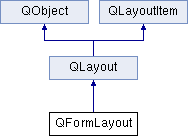
 Public Types inherited from QLayout
Public Types inherited from QLayout Public Methods inherited from QLayout
Public Methods inherited from QLayout Public Methods inherited from QObject
Public Methods inherited from QObject Public Methods inherited from QLayoutItem
Public Methods inherited from QLayoutItem Properties inherited from QLayout
Properties inherited from QLayout Properties inherited from QObject
Properties inherited from QObject Public Signals inherited from QObject
Public Signals inherited from QObject Public Slots inherited from QObject
Public Slots inherited from QObject Static Public Methods inherited from QLayout
Static Public Methods inherited from QLayout Static Public Methods inherited from QObject
Static Public Methods inherited from QObject Protected Methods inherited from QLayout
Protected Methods inherited from QLayout Protected Methods inherited from QObject
Protected Methods inherited from QObject Related Functions inherited from QObject
Related Functions inherited from QObject





